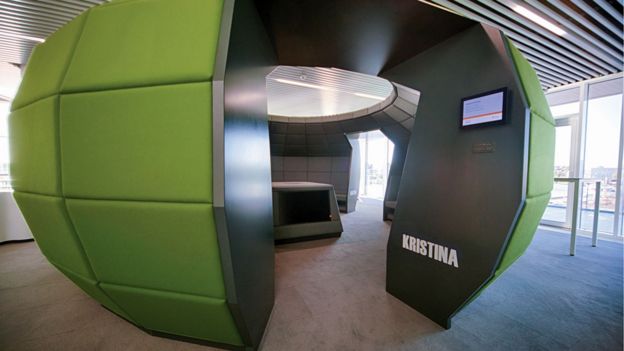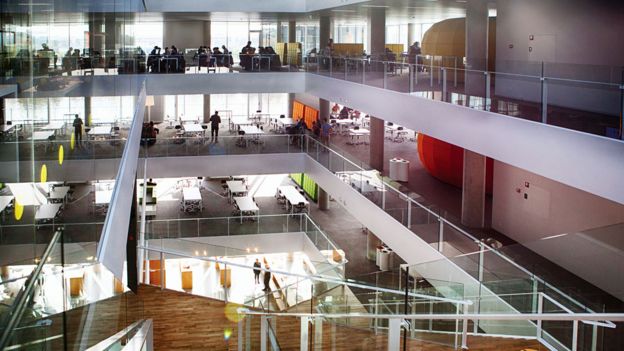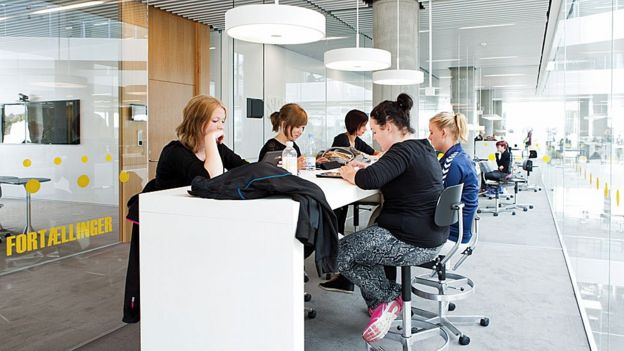
Denmark reinvents lessons for reluctant learners
How do you get young adults back into education if they dropped out and had a negative experience of learning?
How do you show those who failed first time round that the door is still open? How do you get out-of-work youngsters to decide that it's worth their while to get qualifications?
Reaching out to the educationally excluded isn't some kind of philanthropic exercise. It's a very practical and often intractable economic problem for many developed countries.
It is a worst-of-both-worlds position of having unemployed youngsters at the same time as having firms struggling to cope with a shortage of skilled staff.
Denmark is no exception. About 12% of the country's 15 to 29-year-olds are counted as not in education, employment or training or "Neet". At the same time there are "talent shortages" for a range of skilled jobs which means recruiting overseas.
Connected classroom
But where are these young adults going to study?
Voksenuddannelsescenter Syd - or VUC Syd - is offering a different kind of model for such young learners.
This adult education centre, beside a fjord in Haderslev in southern Denmark, is based in a state-of-the-art, £25m building that seems to have gone to great lengths to look nothing like a school.
 Image copyrightVUC Syd
Image copyrightVUC Syd
Image captionMuch of the college has glass walls, but lessons can be taught in igloo-shaped rooms
It's open to anyone but its fees are structured so that the fewer qualifications you have when you enter, the cheaper it is to study. And the core age group attending are young people in their early 20s.
Another incentive for attending is that everyone who joins gets their own iPad, which they can take home.
The whole building is one big connected box, with the tablet computers acting as textbooks, notebooks, cameras for recording lessons and planners. The iPads are also hooked up to interactive screens in classrooms and display screens.
More stories from the BBC's Knowledge economy series looking at education from a global perspective and how to get in touch
The promise of a paperless office is usually only a designer's fantasy. But this college is a sea of uncluttered desks, stylish furniture and high-end technology.
"The message is we take your education very seriously. We want to invest in it," says Vinnie Lerche, head of development.
Digital reach
The concept of openness and transparency stretches to the classroom walls, which are mostly glass. And to provide some private places for meeting, there are round domes, like green igloos, where classes can sit in a circle.
The overall effect is somewhere between a futuristic film and the Teletubbies set.

Image captionThere are thousands of students accessing courses by distance learning
As well as being open to local students, VUC Syd has a wider outreach role.
As well as 8,000 students attending the college, there are 4,000 distance learners. The online courses extend the reach of the college to those who do not want to sit in a classroom, those who are working and those who need to study at a slower pace.
It also opens up courses to people overseas, including students in China.
This openness extends to running its own digital publishing empire. It is producing customised online textbooks, written by teachers and used by students.
The college's publishing unit has produced 96 multimedia iBooks in a year, many of which they have translated into English. These bitesized books are available for download by anyone, not just students registered at the college.
"We couldn't find the publishers' materials, so we needed to make our own," said Ms Lerche.
Independent colleges
The common theme in both the design of the building and the production of the textbooks is that adult education needs to be done differently.
"We have no need for unskilled workers any more," said VUC Syd director Hans Jorgen Hansen.

Image captionStaff at the college produce their own online textbooks
So the college has to help students get back on track with skills for work or to prepare them for further training or academic study. About a thousand of their students go on to university each year, more go into industry.
"The biggest challenge is to give them confidence," said Mr Hansen. "People have never seen their potential. Many have to start from the very basics."
The college gets government funding for each student, but it's an autonomous, self-governing institution. It's part of a chain of 29 VUCs across Denmark - and Mr Hansen says the independence is an important part of being able to innovate.
"But if you're doing something very different, you're very exposed."
And he says they will need to show they are successful in terms of exams, training and reducing the dropout rate, or else risk being told they are "changing too fast".
Denmark's minister of children, education and gender equality, Ellen Trane Norby, says VUC Syd's use of technology "undoubtedly gives opportunities to young adults with very different priorities for learning.
"And for some this might just be the opportunity that makes them go further in the educational system."
But she says this reliance on computers "demands quite a lot from the students as well as the teachers, including high demands of technological skills and… this can be a challenge compared to a more traditional teaching environment".
Adult education is a "high priority" for Denmark, says the minister.
It is important to help those who have missed the first "educational train", says Ms Norby, but it's also becoming an economic necessity.




